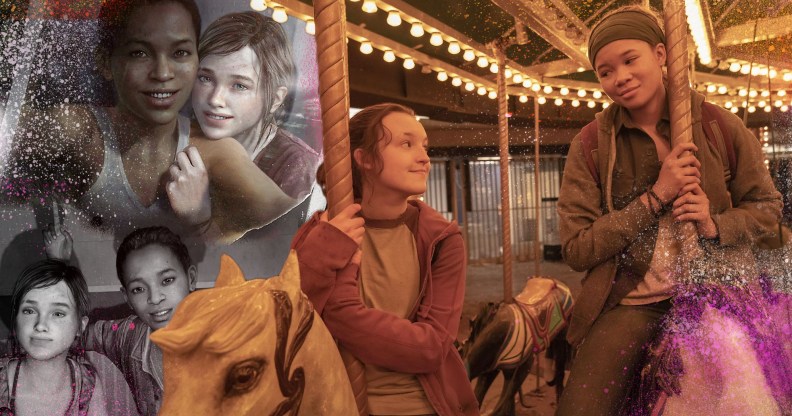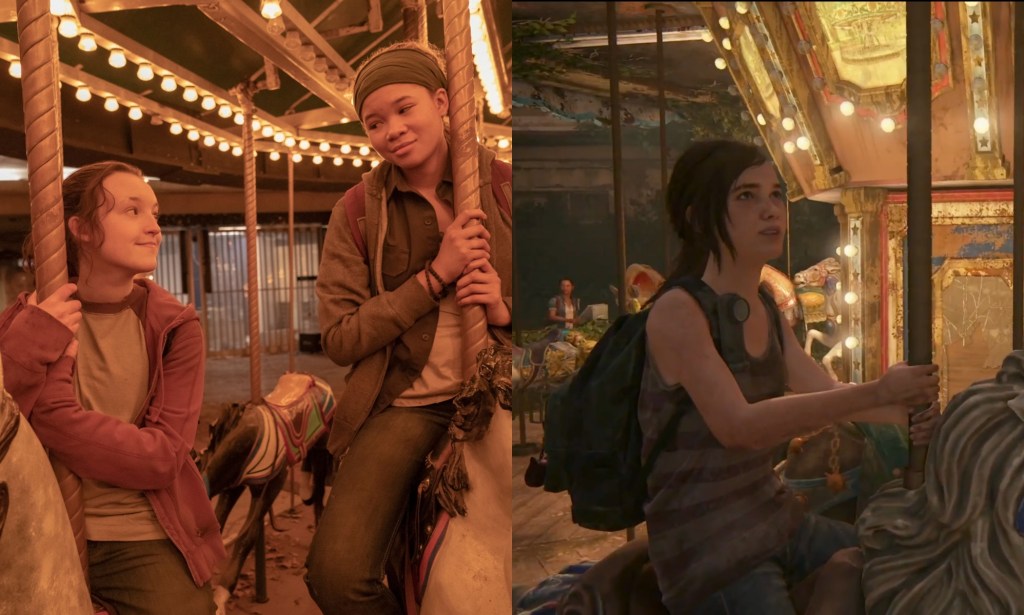Bigots hate Ellie and Riley’s romance in The Last of Us – but it’s always been part of the story

The Last of Us created one of gaming’s most high-profile LGBTQ characters in Ellie. (HBO/Naughty Dog)
Haters are raging after the latest episode of The Last of Us featured another tender queer love story – but the narrative isn’t anything new.
Based on the 2013 video game of the same name, the hit HBO series, which was co-created by Neil Druckmann and Craig Mazin, follows Joel (Pedro Pascal) and Ellie (Bella Ramsey) as they fight their way across a post-apocalyptic US ravaged by fungal-infected zombies.
While the show successfully draws a frightening dystopia, it’s also brought groundbreaking LGBTQ+ representation to the genre, with not one but two episodes centred around queer love stories. Episode three, “Long, Long Time”, which followed the bittersweet romance between Bill (Nick Offerman) and Frank (Murray Bartlett), subverting the pervasive Bury Your Gays trope, and was heralded as one of the best episodes of television ever.
The latest episode, “Left Behind”, was equally moving. Travelling back in time to when Ellie reunites with her rebellious best friend and former roommate Riley (Storm Reid), the episode sees the pair develop feelings for each other after spending the day in an abandoned mall. The adventure culminates in a kiss – before everything goes wrong and they are both bitten by an Infected.
Alongside a wave of praise for the sapphic romance, the show’s LGBTQ+ representation has, rather predictably, drawn outrage from bigots.
However, much like the rest of the series, it is simply following a long-established plot from the video game.
What happens to Ellie and Riley in The Last of Us video game?
People may be forgiven for not knowing the story of Ellie and Riley’s relationship exists since it is not technically in the main gameplay, but rather part of other game-related materials.
If you play the original 2013 game, Riley is simply alluded to when Ellie mentions to Joel that she lost someone close to her – but it is never explored further.
The episode seven plot draws from The Last of Us: American Dreams, a four-issue comic series written by Druckmann and Faith Erin Hicks, and The Last of Us: Left Behind, a DLC add-on to the game, based on the comic series.
The episode stays pretty faithful to gameplay.
In the show, Joel suffers life-threatening injuries which trigger Ellie’s flashback as she fights to save him. In the game, as Ellie and Riley explore the shopping mall after bunking off from military school, players can delve into various flashbacks.
And, just as in “Left Behind”, the two spend a wonderful day together exploring the mall and reliving the days of their youth away from the horrors of the outside world.
While it’s unconventional gameplay for a survival game, Druckmann revealed that it came about naturally through discussion he had with Hicks.
“We both made the mistake when we were describing Ellie and Riley for the first time – we said Ellie was attracted to Riley,” Druckmann told Wired.
“We meant, I think, that she was just really drawn to her, that she really looked up to her. But then I thought in the back of my mind, what if there’s something more than that? It became this interesting dimension of their relationship that we could explore.”
From riding on the merry-go-round to poignant conversations, no stone is left unturned in the adaptation.

Just as in the episode, the pair also kiss before being attacked – and the audience is left to imagine Riley’s terrible fate, as we know Ellie is immune.
As for Ellie’s sexuality, people don’t need to look far to see that in the video game, as she finds a girlfriend, Dina, in the 2020 sequel The Last of Us II. The relationship is expected to be brought to life in the next season of the show.
Bigoted viewers of The Last of Us brought up similar grievances with Frank and Bill’s storyline in episode three. Although more creative licence was used in bringing their love story to life, there are plenty of hints about Bill’s sexuality, from the gay porn magazines to his frequent description of Frank as his “partner”.
Although their relationship ended on a bitter note in the game, with Frank leaving a note to Bill saying he “hated his guts”, turning them into a loving couple in the show was a conscious choice.
As Druckmann explained on The Last of Us podcast, he wanted to contrast Tess’ (Joel’s partner) tragic death in episode two with a hopeful story.
Reid, meanwhile, issued a stern warning to homophobic viewers criticising the LGBTQ+ representation.
“Like Bella said when episode three came out: if you don’t like it, don’t watch,” Reid told EW.
“We are telling important stories. We’re telling stories of people’s experiences and that’s what I live for. That’s what makes good storytelling because we are telling stories of people who are taking up space in the world.”
The Last of Us airs on Sunday at 9pm ET on HBO in the US and Monday at 2am GMT on Sky in the UK.
How did this story make you feel?

